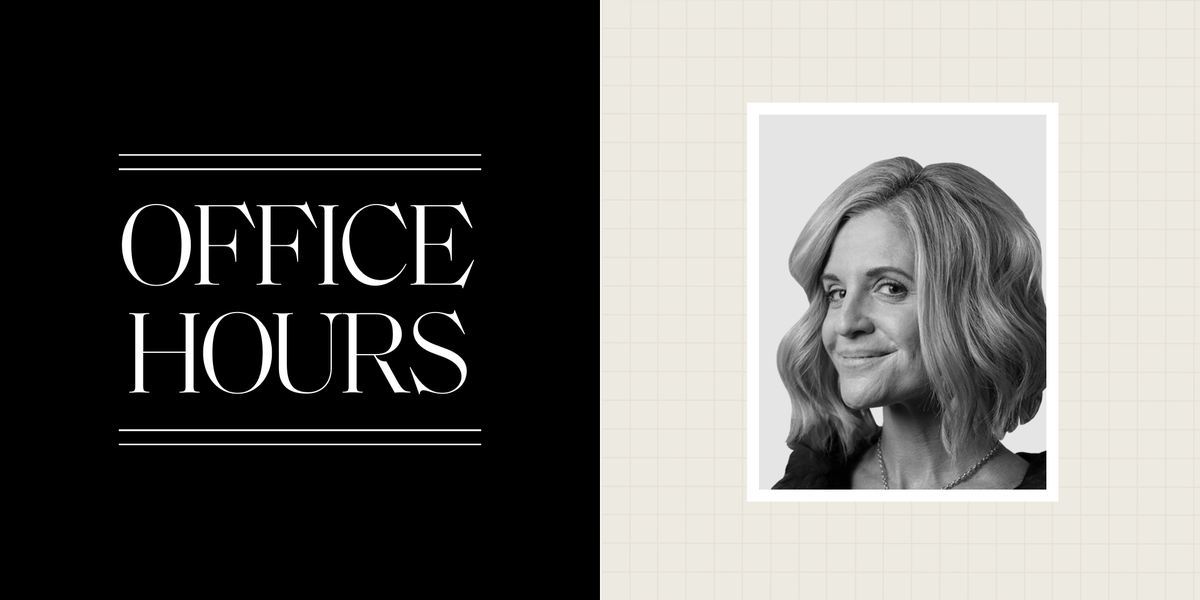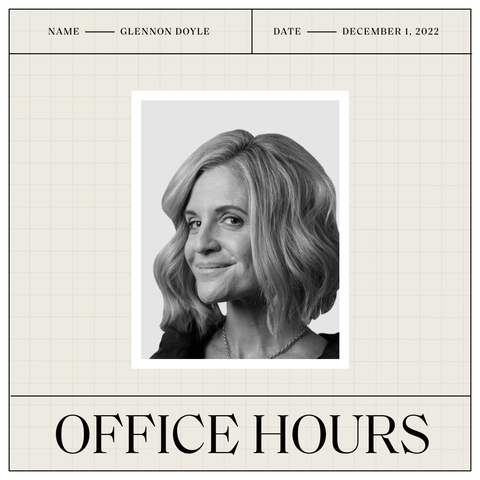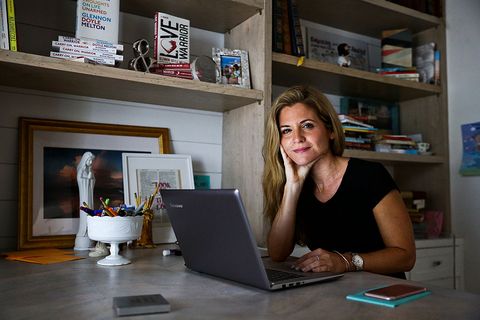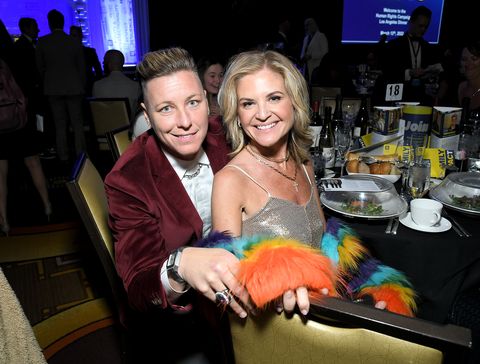
In the monthly ELLE.com series work hoursWe ask people in powerful positions to take us through their first jobs, their worst jobs, and everything in between. This month we talked to best-selling Glennon Doyle authorFounder of the non-profit organization Together we riseand podcast host We can do hard things, named after its signature and oft-repeated motto. Doyle first began sharing her writings on her viral blog Momastery, Where she opened up about her life As a progressive christian mom. Since those early days of the internet, Doyle's fans have watched her go offline, all while navigating some of the hardest and most beautiful things in life. In her three memoirs, she wrote about eating disorders and addictions. motherhood, infidelity, divorce, falling in love with his now wife, football legend Abby Wambach; co parenting; and her continuing mission to share her bravest and truest self with the world. "When we're open-minded and rooted in curiosity, we inevitably change," says Doyle. "For me, this is a victory." Here, she shares how she's framed her career as "a very anxious and sensitive person," the deliberate ways she's protective of her work, and her dream job to date.
My first job
My first real job that was important to me was teaching. My parents were teachers, and it was understood that it was the most important job in the world. I still think so, and I still miss him. Little known fact: The first book I published was an educational book. My entire class spoke English as a second language, and most of my students were recent immigrants. That was when No child was left behind It was all the rage, and standardized tests started tracking kids in very negative ways. I watched it happen to my students, because they were brilliant, but they couldn't show their brilliance on these exams. My colleague Amy Green and I came up with a way to help them beat the legal exams. Our school began to use it, and then a group of schools in the district, and then it became a book called Speech test. Teaching is when I have seen the effects of institutional racism, empowerment and classism up close. I had a front row seat in a third-grade classroom, watching my kids slowly get kicked out before they had a chance. I think this affects everything I do.
My worst job
I was a waitress for a while. In most jobs, there is a set of expectations that everyone agrees on, and if you relatively meet those expectations, you get paid, right? With the waitress, that's not what happens. Every stranger they enter has their own set of expectations for you and how you should act and what good service means to them. A million times a night you have to analyze and submit to other people's expectations of you, hoping to get money. I know of no other job that relies so heavily on the whims of anyone interfering with whether or not you make a living.
Why this podcast host is perfect for me
I have always been an introvert. I have always said that I love people, but not in person. I love humanity but not humans. As a very introverted and sensitive child, I used to get to know people by sitting in the corner and reading Ramona Repeatedly. And that's what I'm doing now. Basically I'm doing a comprehensive report on every single person that comes on Earth. I go for a walk, thinking about them, and me [co-host] My sister and I come together, bouncing ideas off each other. then [my other co-host] Abby responds to everything in real time. I recently sent her this meme saying, "Wouldn't it be cool to have a job as a podcast host whose sole job is to respond in real time to other podcast hosts who were prepping?" But that's why people love her, because she lives in the moment.
The best - and worst - part of working with my wife
Working with Abby means our lives are an ongoing conversation. We don't have any separation between what happens in our work lives and in our personal conversations - and that's also the hard part. For example, I realized I was letting my frustrations out with her on the podcast. we were in Personnel Affairs conversation, and I was very upset, because I felt it wasn't brief enough. I was like, "Twist it up, wrap it up." Then we had to talk about how maybe we need to communicate more professionally in the podcast space so I can say things like that out there and not take it home. My point is, the hardest part is wearing two different hats. Here, we are fellows who love each other and want to be tender to each other. Then when we're not on the podcast, I can't control her anymore. It's hard, but I feel so lucky. I wouldn't get it any other way. And it's hard only because we're so careful with each other, because we love each other so much.
The deliberate way I built my team
Throughout my career, I've strategically kept my team very small. There were a million turns in the road where we could have been bigger, but I knew I didn't want to. I didn't want to create a monster that I would have to feed for the rest of my life. And as an artist and activist, I needed to be with people who knew I could blow this up on us at any moment, even on purpose; I can tell something means it's over. Everyone on my team knows this is the way we live. We will never allow what is "ok" to say or do dictate whether or not we do it. This kind of agility requires everyone to be passionate and passionate about what we do. So our entire team is me, my sister, Abby, and my two best friends, Dina and Alison. There is an upside to keeping it so small, but the dark side is that everyone works so hard. We don't have much boundaries with each other, which is ironic, because we're taught boundaries. We are obsessed with limits. It's just that we ourselves do not believe in them [laughs]. So we email and text each other at two in the morning. But it works for us, as we are a very small family.
The way I view mental illness as a strength
I always find that the people I love most — and think of them as the most interesting, who do the most for the world, who are the most creative, who are the kindest, who are the brightest people — are often mentally ill in some sort. Many people turn to addiction because of that deep sensitivity or craving for something different from what appears to us in everyday life. The space between accepting everything the way it is and craving more—even though that can stifle that with things that hurt us in the long run—is art, philanthropy, and activism. We can reach out to the things that hurt us, but when many of us find out about this bullshit, we still reach for it, and it turns out that access is everything good in the world. I think people who are deeply affected or anxious are often just people who are really paying attention. If you're paying attention, there's a lot to worry about. having said that, [mental illness] It could be a doozy.
How do I refocus after a stressful day at work?
I'm going for a walk with my wife. I think walking saves me every day. I no longer want to exercise in such a way as to cause suffering; I've done enough of that in my life. And I don't put anything in my ear so I can actually hear myself thinking. Then when I get home I usually sit with my dogs. I just love my dog so much. It's something about how they are the only beings who like me the more the less productive I am. Everyone else, they say they love you, but they really want you to. Dogs are like, "Please, if you just sit here all day, if you just watch Netflix, if you stay here, we'll love you more."
How I changed in the public eye while still respecting myself in the past
I've come to believe that life is about evolution. It is constantly about every conversation, everything you read, every person you meet, every place you see, and allowing them to change you into the next, more beautiful version of yourself. And I don't think it has to be dramatic. When we are open and radically curious, we are inevitably transformed. That, for me, is victory. But I realized that this is not the way everyone looks at life. People will say to me, "How are you different now than you were in your first book?" Are you honest now, or were you honest then? But that was as true as I could be then, and now I'm as honest as I can be now. If I were the same person I was 10 years ago, I would be devastated. I constantly beat myself up. Seven years ago, I thought I was a Christian Pisces Rectum. Now, I'm a weirdo, I don't know, [and a little] Christian P. Tower. I found out I'm not even a Pisces. I've been reading the wrong horoscopes for 20 years! And I won't write another book until I'm a new person. So I hope to keep changing.
This interview has been edited and condensed for clarity.

Madison is a senior writer/editor at ELLE.com, covering news, politics, and culture. When she's not online, you'll likely find her taking a nap or eating banana bread.
Source link



0 Comments